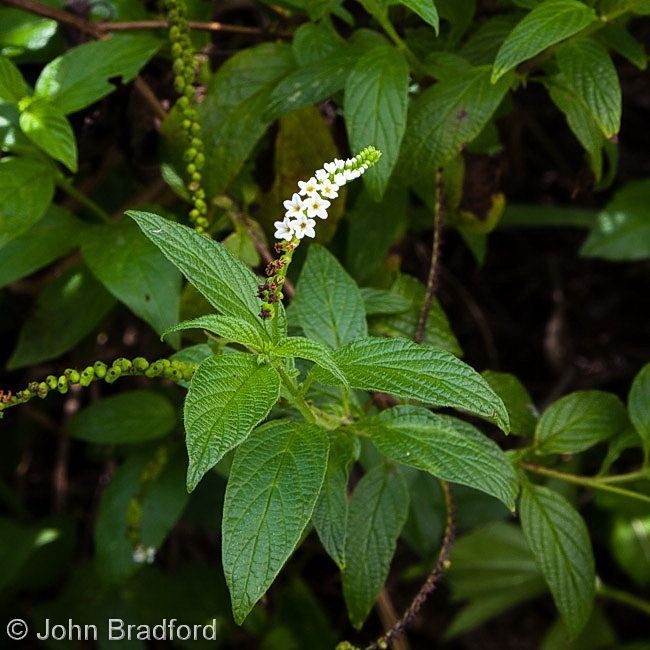FNPS Plant Database
Heliotropium angiospermum
Nomenclature
Common Name:
Synonym(s):
Genus species:
Family:
Boraginaceae
Plant Specifics
Form:
Size:
Life Span:
Long-lived perennial
Flower Color:
Fruit Color:
Phenology:
Noted For:
Landscaping
Recommended Uses:
Considerations:
Availability:
Propagation:
Light:
Moisture Tolerance:
Always Flooded---------------------------------Extremely Dry
□□□□□□□□□□□□□□□■■■■■■■■■■■■□□□□□□□□□□□□□□□
Usually moist, occasional inundation -to- Not wet but not extremely dry
Salt Water Flooding Tolerance:
Unknown
Salt Spray/Salty Soil Tolerance:
Moderate. Tolerant of salty wind and may get some salt spray
Soil or Other Substrate:
Sand
Soil pH:
Suitable to Grow In:
8A,8B,9A,9B

USDA zones are based on the average annual extreme minimum winter temperature.
Don't know your zone? Click here to search by zip code.
Vouchered In:
Ecology
Wildlife:
Nectar plant for Bahamian swallowtail (Heraclides andraemon), cassius blue (Leptotes cassius), Florida white (Appias drusilla), gray hairstreak (Strymon melinus), great southern white (Ascia monuste), gulf fritillary (Agraulis vanilla), Miami blue (Cyclargus thomasi bethunebakeri), queen (Danaus gilippus), rudy daggerwing (Marpesia petreus), Schaus' swallowtail (Heraclides aristodemus) and other butterflies. (IRC).
Native Habitats:
Comments:
Ethnobotany:
General Comments:
Citations:
Gann, G.D, C.J. Abbott, C.G. Stocking, K.N. Hines, and collaborators. (2001+). Scorpionstail. Natives For Your Neighborhood. ( https://www.regionalconservation.org/beta/nfyn/plantdetail.asp?tx=Heliangi ). Accessed 2026. The Institute for Regional Conservation. Delray Beach, FL.
Hammer, Roger. (2015). Attracting Hummingbirds and Butterflies in Tropical Florida. University Press of Florida, Gainesville, FL.
Huegel, Craig N. (2012). Native Wildflowers and Other Ground Covers for Florida Landscapes. University Press of Florida, Gainesville, FL.
Osorio, Rufino. (2001). A Gardener's Guide to Florida's Native Plants. University Press of Florida, Gainesville, FL.
Traas, Pamela. (2001). Gardening for Florida's Butterflies. Great Outdoors Publishing Co, St. Petersburg, FL.
Wunderlin, R. P, B. F. Hansen, A. R. Franck, and F. B. Essig. (1999+). Atlas of Florida Plants. ( https://florida.plantatlas.usf.edu/ ). [S. M. Landry and K. N. Campbell (application development), USF Water Institute.] Institute for Systematic Botany, University of South Florida, Tampa, FL.









